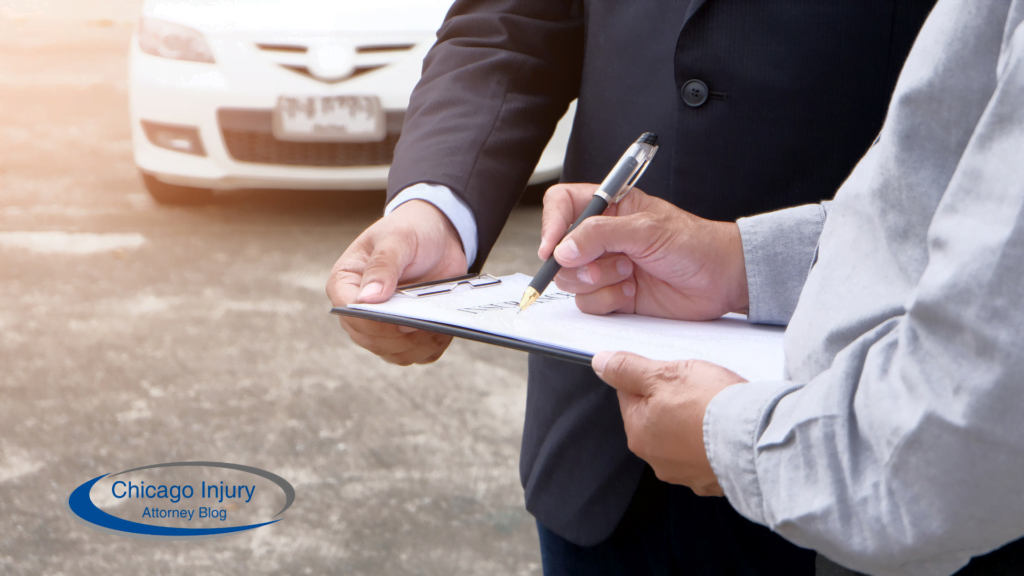Car accidents can be stressful and overwhelming, especially when it comes to dealing with insurance disputes. In this article, we will cover everything you need to know about handling insurance disputes after a car accident. From the initial steps you should take after a collision to understanding third-party insurance claims and the impact on your insurance rates, we will guide you through the process. Stay informed on how to navigate insurance disputes and seek legal assistance when needed.
Understanding Insurance Disputes After a Car Accident
Understanding Insurance Disputes After a Car Accident is crucial for navigating the complexities of insurance claims and settlements effectively.
One common type of dispute that often arises after a car accident is determining which party is at fault. This can be a contentious issue, as each driver may have a different version of events and evidence to support their claim. Insurance companies play a significant role in these situations, as they investigate the accident, review the policies of those involved, and make decisions on liability.
When fault is disputed, the insurance companies may enter negotiation phases to determine how to allocate costs and coverage. These negotiations can be complex and sometimes lead to unresolved conflicts. In such cases, seeking legal assistance becomes essential to ensure your rights and interests are protected.
Overview of Dealing with Insurance Disputes
An overview of Dealing with Insurance Disputes provides insights into the processes involved in resolving conflicts between policyholders and insurance companies.
When a policyholder encounters an issue with their insurance claim, the initial step typically involves contacting the insurance company to inform them about the dispute. This can be done through various means such as phone calls, emails, or written letters, providing details of the claim and the reasons for the disagreement. Once the communication is established, the insurance company may request specific documentation to support the claim, including policy details, incident reports, and any relevant proofs. Proper and thorough documentation is essential to support the policyholder’s case and increase the chances of a favorable resolution.
Importance of Handling Insurance Disputes
The Importance of Handling Insurance Disputes cannot be overstated as it can impact the compensation received for damages and injuries resulting from a car accident.
When individuals face insurance disputes after a car accident, swift resolution is crucial to ensure they receive the rightful coverage for medical bills, vehicle repairs, and other related expenses. Delaying addressing these disputes can lead to prolonged financial strain, emotional distress, and even hinder the process of moving forward from the incident. Seeking resolution through appropriate legal channels not only helps in navigating complex insurance policies and regulations but also ensures fair treatment and a timely settlement. Employing the expertise of insurance dispute attorneys can provide invaluable support in negotiating with insurance companies, presenting a strong case, and safeguarding one’s rights.
Initial Steps After a Car Accident
Taking the Initial Steps After a Car Accident is crucial to ensuring timely assistance, documenting evidence, and safeguarding your legal rights.
Immediately after the accident, ensure the safety of all involved by moving to a safe location, if possible, to avoid further harm or danger. Check for injuries and call emergency services if needed. It is important to gather information such as names, contact details, and insurance information from all parties involved.
- Notify the police of the accident and wait for their arrival to file a report. This official documentation can be vital for insurance claims and legal proceedings.
Preserve evidence by taking photos of the accident scene, including vehicle damages, road conditions, and any relevant traffic signs or signals. Do not admit fault or discuss specifics of the accident with other parties involved. Contact your insurance company to report the incident and seek guidance on the next steps to take in the claims process.
Gathering Information at the Scene
Gathering Information at the Scene of a car accident involves documenting details such as vehicle damage, injuries, and witness contact information.
It is crucial to accurately record the make, model, and license plate number of all vehicles involved. Photographic evidence of the accident scene, including skid marks, road conditions, and traffic signals, can provide valuable insights later on. Plus capturing the immediate aftermath, gathering witness statements is vital. Contact details, statements, and any observations from individuals who saw the accident unfold can significantly strengthen your case.
Contacting Your Insurance Company
Contacting Your Insurance Company promptly after a car accident is essential to initiate the claims process and seek guidance on next steps.
When contacting your insurance company, the first step is to gather all pertinent information related to the accident, such as the location, time, and details of the event. Once you have these details on hand, you can proceed to report the claim to your insurance provider. Providing your policy number and relevant personal details will expedite the process.
Clear communication is key during this interaction, so ensure you describe the accident accurately and comprehensively. Be prepared to answer any questions regarding the incident and provide any additional documentation or evidence required by the insurer to process your claim efficiently.
Deciding on Legal Action
Deciding on Legal Action post-car accident involves assessing the need for legal representation, evaluating potential claims, and considering the implications of a lawsuit.
When determining whether to pursue legal action after a car accident, one must carefully weigh several crucial factors. The extent of the damages incurred is a pivotal consideration, as it directly impacts the potential compensation one may seek. The liability and fault allocation play a significant role in the decision-making process, as proving fault is essential for a successful case.
Consulting with a personal injury lawyer can greatly aid in navigating this complex terrain. These legal professionals specialize in handling such cases and possess the expertise to assess the viability of a claim. They can offer valuable insights on the legal options available and guide individuals on the best course of action.
Dealing with Insurance Companies
Dealing with Insurance Companies requires understanding the claims process, negotiating settlements, and navigating the complexities of insurance coverage.
When interacting with insurers, it’s crucial to provide detailed documentation of the accident, including police reports and medical records, to support your claim.
- The at-fault driver’s insurer will typically handle the claim and payment if you are not at fault.
- Your own insurance company may also be involved, especially if you have coverage for uninsured or underinsured motorists.
Understanding the specific terms of your policy, such as liability limits and deductibles, is essential for maximizing your claim settlement.
Negotiating with insurance adjusters may require patience and persistence to ensure you receive fair compensation for your injuries and damages.
Interactions with At-Fault Driver’s Insurance Company
Interactions with the At-Fault Driver’s Insurance Company involve providing relevant information, discussing fault determinations, and negotiating settlements based on fault-based car insurance policies.
When engaging with the insurance company of the driver at fault, essential steps include reporting the accident, submitting evidence such as police reports and witness statements, and detailing the extent of damages incurred. Understanding the nuances of fault-based insurance systems is crucial, as it impacts the compensation you may receive.
- During negotiations, it is important to clearly present your case, emphasizing factors that establish the other driver’s liability. Providing coherent evidence and documentation can strengthen your position.
- Be prepared for potential challenges or disputes from the insurance company regarding fault determination, and be willing to advocate for your rights and seek legal counsel if necessary to ensure a fair outcome.
Understanding Coverage When Not at Fault
Understanding Coverage When Not at Fault is essential for navigating claims in no-fault insurance states and ensuring adequate compensation for damages.
When involved in an accident where you are deemed not responsible, the intricacies of insurance coverage can significantly impact your ability to receive proper compensation. residing in a no-fault insurance state means each party’s insurance company will cover their respective policyholder’s medical bills and associated costs, regardless of fault. This system is designed to expedite the settlement process and avoid lengthy legal battles. It can also limit your ability to sue the at-fault party for additional damages.
Filing a Claim with Your Insurance Company as a Last Resort
Filing a Claim with Your Insurance Company as a Last Resort may be necessary when disputes with other parties or insurance companies cannot be resolved amicably.
When considering this option, it is crucial to review your policy details thoroughly to understand the coverage, deductible, and any limitations that may affect your claim. Ensure you have all necessary documentation, such as police reports, medical records, and receipts, to support your claim.
Initiating a third-party claim involves contacting the at-fault party’s insurance company to start the process. Be prepared to provide detailed information about the incident and any damages incurred.
If disagreements arise during negotiations, escalating the matter to a formal claim resolution, such as arbitration or mediation, may be necessary. These methods involve neutral third-parties helping reach a resolution without going to court, saving time and costs.
Third-Party Insurance Claims
Understanding Third-Party Insurance Claims involves comprehending the roles of different parties, navigating claim procedures, and seeking compensation from the at-fault party’s insurer.
Regarding third-party insurance claims, the process typically begins once the injured party notifies the at-fault driver’s insurance company about the incident. The claimant needs to provide detailed documentation, including police reports, medical records, and any evidence supporting the claim. The insurance company then investigates the claim to determine liability. It is essential to communicate effectively with the insurance adjusters and provide all necessary information in a timely manner to facilitate the settlement process. Negotiation skills play a crucial role in securing a fair compensation amount. If the initial settlement offer is inadequate, legal representation may be necessary to escalate the claim and potentially pursue legal action if needed.
Explaining Third-Party Insurance Claims
Explaining Third-Party Insurance Claims requires understanding liability assessments, coverage limitations, and fault attributions in multi-party accident scenarios.
When dealing with third-party insurance claims, determining fault in multi-party accidents can be a complex process. Insurance companies often face challenges in distinguishing each party’s level of responsibility, which directly impacts claim settlements. Insurers must carefully evaluate the circumstances leading to the accident, review evidence, and assess applicable laws and regulations.
Accurate fault attribution is crucial as it influences the compensation each party receives. This complexity underscores the importance of comprehensive insurance coverage that takes into account various liability scenarios and potential restrictions.
Process of Filing a Third-Party Insurance Claim
The Process of Filing a Third-Party Insurance Claim involves submitting detailed evidence, supporting documentation, and negotiating settlements with the at-fault driver’s insurance provider.
When filing a third-party insurance claim, the initial step is crucial – gather all relevant information related to the accident. This includes details of the incident, contact information of witnesses, and the at-fault driver’s insurance policy number. Once this is in place, it’s time to notify the liable party’s insurance company about the claim. Be sure to provide them with a clear and concise narrative of the event along with any photographs or police reports supporting your case.
Documentation is key to a successful claim. Prepare all medical records, repair estimates for your vehicle, and any other expenses incurred due to the accident. These documents play a vital role in substantiating your claim and negotiating a fair settlement. Remember, thorough documentation can significantly impact the outcome of your claim.
Regarding negotiating settlements, having a clear understanding of your rights and entitlements is essential. Make sure to familiarize yourself with the terms and conditions of the insurance policy, as well as the applicable laws in your region. Present your case confidently and professionally, emphasizing the strength of your evidence and the validity of your claim. Be open to discussions and counteroffers, but stand firm on what you believe is fair compensation for the damages suffered. Effective negotiation skills can help you secure a favorable outcome and ensure that you are adequately compensated for your losses.
Impact on Insurance Rates
The Impact on Insurance Rates After a Third-Party Accident can lead to premium adjustments, policy modifications, and potential changes in coverage terms.
Insurers play a crucial role in determining how third-party accidents impact insurance rates. Factors such as the severity of the accident, the number of parties involved, and the overall risk associated with the event are carefully evaluated to assess the level of financial risk for the insurer.
Adjusting premiums is a common practice post-accident as insurers aim to recalibrate the policy pricing to reflect the increased risk of future claims. This adjustment is typically based on statistical data, historical trends, and the individual circumstances of the accident.
Effects on Insurance Rates After a Third-Party Accident
The Effects on Insurance Rates After a Third-Party Accident vary based on the state’s insurance regulations, the insurer’s policies, and the driver’s history of claims.
When a third party is involved in an accident, insurance rates can be affected significantly due to the increased risk of future claims. Insurance companies take into account various factors such as the severity of the accident, liability determination, and the extent of damages. In no-fault car insurance states, where each driver’s insurance covers their own injuries regardless of fault, premium adjustments may differ compared to states with traditional fault-based systems.
The way insurers calculate premiums after a third-party accident can also vary depending on the state’s laws and the insurer’s individual policies. Insurance companies utilize actuarial data, statistical models, and historical claim information to determine the level of risk associated with insuring a driver who has been involved in such accidents.
Challenges When Not at Fault
Navigating Challenges When Not at Fault involves addressing insurance denials, evaluating damages, and understanding the complexities of accidents involving new vehicles.
Dealing with an insurance denial can be frustrating and bewildering for the innocent party involved in a vehicular mishap. Often, the process of proving one’s innocence entails meticulous documentation and timely responses to the insurer’s queries. The evaluation of damages requires a comprehensive understanding of not just the visible external harm but also the potential internal issues that might arise post-accident.
A unique set of considerations comes into play when the accident involves new vehicles, such as the complexities associated with determining depreciation rates and the role of cutting-edge technology in repairs and replacements. The rapid evolution of automotive innovations adds a layer of complexity to the aftermath of such incidents, necessitating specialized expertise to navigate these intricacies.
Insurance Denial for Damages
Insurance Denial for Damages can occur due to coverage disputes, policy limitations, or insufficient evidence supporting the claim, necessitating further review and potential legal intervention.
When submitting a claim, it’s crucial to thoroughly understand your policy coverage to avoid potential denials. In many cases, claims get denied due to discrepancies between the damages incurred and the scope of coverage outlined in the policy. Insurance companies may deny claims as a result of delays in reporting the damage, which can lead to questions regarding the validity of the claim. To challenge a denial, individuals need to carefully review their policy, gather any relevant documentation or expert opinions, and clearly articulate their case in writing. Seeking legal assistance can also significantly enhance the chances of successfully challenging an insurance denial by navigating complex legal procedures and negotiating with insurance companies.
Dealing with Accidents Involving New Vehicles
Dealing with Accidents Involving New Vehicles requires assessing repair costs, determining liability, and understanding the implications of insurance coverage for vehicle replacement or repair.
Accidents involving new vehicles can present unique challenges when it comes to estimating repair costs. Given the advanced technology and specialized parts in modern vehicles, repair expenses can escalate rapidly, affecting the overall cost assessment. Determining liability in these accidents can be intricate, especially in cases where autonomous features or software malfunctions are involved. Expert evaluation is often crucial to accurately apportion responsibility.
Regarding insurance coverage, various factors come into play. Policies may differ in their coverage of new vehicle replacement versus repair, impacting the financial implications for both the policyholder and the insurer. Understanding the nuances of insurance policies and applicable laws is vital for ensuring adequate compensation and resolution in the aftermath of such accidents.
Seeking Legal Assistance
Seeking Legal Assistance post-car accident involves evaluating fault disputes, assessing legal options, and understanding the benefits of professional representation.
Disputing fault after a car accident can be highly complex, involving multiple parties and insurance companies. Seeking legal counsel can prove crucial in navigating through these intricate matters and ensuring that your rights are protected. When choosing a car accident lawyer, it is essential to consider their experience in handling similar cases, their track record of success, and their communication style.
Having legal representation offers numerous advantages in insurance disputes and claim negotiations. Lawyers are adept at negotiating with insurance companies to maximize your compensation, handling paperwork, gathering evidence, and representing your interests in court if necessary.
Considerations for Disputing Fault
Considerations for Disputing Fault involve reviewing evidence, consulting legal experts, and preparing a strong case to challenge fault attributions in car accidents.
Understanding the circumstances of the accident is crucial in disputing fault. Examining police reports, witness statements, and photographic evidence can help strengthen your case. Seeking guidance from experienced lawyers specializing in personal injury and insurance claims can provide valuable insights. Building a compelling argument backed by clear evidence is a key strategy when disputing fault.
In challenging fault determinations, it’s essential to analyze how laws and regulations apply to your specific situation. Factors such as road conditions, weather, and the actions of all parties involved must be carefully assessed. Crafting a coherent narrative that demonstrates your adherence to road safety regulations and responsible driving practices is paramount.
- Documenting any injuries sustained
- Seeking medical attention promptly
- Keeping records of all expenses related to the accident
Benefits of Consulting a Car Accident Lawyer
The Benefits of Consulting a Car Accident Lawyer include expert guidance, legal advocacy, and improved outcomes in insurance claim settlements and legal proceedings.
Car accident lawyers are experienced professionals who can navigate the complexities of insurance disputes with precision and efficiency. They offer critical insights into the intricacies of insurance policies and ensure that clients receive fair compensation for their injuries and damages.
These legal experts handle all aspects of claim negotiations, from gathering evidence to negotiating with insurance companies on behalf of their clients. Their expertise in this area often leads to faster and more favorable outcomes for those seeking compensation.
Regarding legal representation, car accident lawyers are well-versed in personal injury law and have a deep understanding of the legal processes involved in filing a claim or pursuing a lawsuit. They provide strong courtroom advocacy and strive to secure the best possible outcome for their clients.
Frequently Asked Questions
What should I do if my insurance company denies my claim after a car accident?
If your insurance company denies your claim after a car accident, you should first review your insurance policy to understand the specific reasons for the denial. If you believe the denial is unjustified, you can appeal the decision through the insurance company’s dispute resolution process or seek legal assistance.
Can I negotiate with my insurance company to get a higher settlement?
Yes, you can negotiate with your insurance company to get a higher settlement. However, it is important to do so carefully and with evidence to support your claim. It may also be helpful to seek the advice of a legal professional who can assist with negotiations and ensure you receive a fair settlement.
What is the role of a lawyer in an insurance dispute after a car accident?
A lawyer can play a crucial role in an insurance dispute after a car accident. They can help you understand your rights and options, gather evidence to support your claim, negotiate with the insurance company, and represent you in court if necessary. A lawyer can also help ensure you receive fair compensation for your injuries and damages.
Can I file a complaint against my insurance company for not handling my claim properly?
Yes, you can file a complaint against your insurance company if you believe they are not handling your claim properly. You can file a complaint with your state’s insurance department or regulatory agency, or seek legal assistance to take further action against the insurance company.
How long do I have to file a dispute with my insurance company after a car accident?
The time limit for filing an insurance dispute after a car accident varies depending on the state and the terms of your insurance policy. It is important to review your policy and consult with a lawyer to determine the specific time limit for your case.
What can I do if the other driver’s insurance company is delaying the claims process?
If the other driver’s insurance company is delaying the claims process, you can seek assistance from your own insurance company to help resolve the issue. You can also consult with a lawyer who can communicate with the other driver’s insurance company on your behalf and help move the claims process forward.





